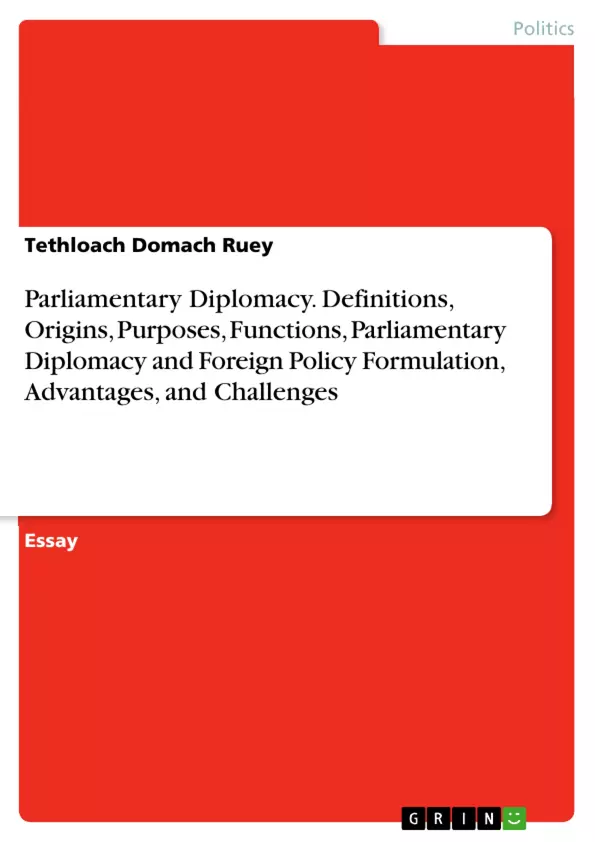Traditionally, diplomacy is the responsibility of a government, specifically the Ministry of Foreign Affairs. However, the evolving diplomacy landscape involved various actors, such as parliament. Parliament is involved in diplomacy because governments want legislatures to play a crucial role in foreign policy implementation. Furthermore, the involvement of parliament in diplomacy is connected with globalization and parliamentarians’ desire to tackle international issues.
In governments, diplomacy is an instrument for implementing a foreign policy. Traditionally, diplomacy is the responsibility of the government’s executive branch, specifically the Ministry of Foreign Affairs. However, the evolving diplomacy landscape requires transgovernmental relations to coordinate and implement a state foreign policy. A government formulates and implements a state foreign policy, and parliament, dependent on the state system, can initiate, defend, evaluate, and oversee a state’s foreign policy through its Foreign Affairs Committee. In addition to its oversight responsibility, parliament has also become an implementer of foreign policy to a certain extent. This is why, inter alia, parliament got into diplomacy.
The transcendence of diplomacy beyond its borders requires not only transgovernmental relations and parliament but also non-state actors such as private citizens, non-governmental organizations, and terrorist organizations. This paper analyzes why and how parliament became active in diplomacy, traditionally a government responsibility. To answer such questions, it is essential to comprehend what parliamentary diplomacy is, its purposes, and its functions. How did diplomacy find its way into parliament? Is it an extension of foreign policy or a different form of diplomacy? What does it encompass?
The paper will provide an in-depth analysis of parliamentary diplomacy, specifically its definitions, origins, purposes, functions, role in shaping foreign policy, advantages, and challenges. Chapter One will analyze parliamentary diplomacy’s definitions, origins, purposes, and functions. Chapter Two will discuss parliamentary diplomacy and foreign policy formulations. Chapter Three will concisely explain the advantages and challenges of parliamentary diplomacy. The conclusion will succinctly summarize the paper and provide recommendations.
Inhaltsverzeichnis (Table of Contents)
- Chapter One: Analysis of Parliamentary Diplomacy
- A. Definitions of Parliamentary Diplomacy
- B. Origins of Parliamentary Diplomacy
- C. Purpose of Parliamentary Diplomacy
- D. Functions of Parliamentary Diplomacy
- Chapter Two: Parliamentary Diplomacy and Foreign Policy Formulations
- Chapter Three: Advantages and Challenges of Parliamentary Diplomacy
Zielsetzung und Themenschwerpunkte (Objectives and Key Themes)
This paper aims to provide an in-depth analysis of parliamentary diplomacy, exploring its definitions, origins, purposes, functions, role in foreign policy formulation, advantages, and challenges. It examines how parliamentary diplomacy has evolved as a significant actor in international relations and its relationship with traditional diplomacy.
- Definitions and origins of parliamentary diplomacy
- The functions and purposes of parliamentary diplomacy
- The role of parliamentary diplomacy in foreign policy formulation
- Advantages and challenges associated with parliamentary diplomacy
- The relationship between parliamentary diplomacy and traditional diplomacy
Zusammenfassung der Kapitel (Chapter Summaries)
Chapter One: Analysis of Parliamentary Diplomacy: This chapter delves into the multifaceted nature of parliamentary diplomacy, beginning by defining the term and clarifying its distinction from other uses of the word "parliament." It traces the historical origins of parliamentary diplomacy, highlighting key figures like Philip C. Jessup and Dean Rusk, and their contributions to defining its characteristics. The chapter further explores the various purposes of parliamentary diplomacy, emphasizing its role in promoting international cooperation and influencing foreign policy, while acknowledging its varying roles in different international organizations. Finally, it analyzes the functions of parliamentary diplomacy, covering both bilateral and multilateral interactions, including the roles of various international parliamentary institutions.
Chapter Two: Parliamentary Diplomacy and Foreign Policy Formulations: [Summary for Chapter Two would go here. The provided text does not include Chapter Two content.]
Chapter Three: Advantages and Challenges of Parliamentary Diplomacy: [Summary for Chapter Three would go here. The provided text does not include Chapter Three content.]
Schlüsselwörter (Keywords)
Diplomacy, parliament, foreign policy, Ministry of Foreign Affairs, bilateral diplomacy, multilateral diplomacy, international relations, international law, inter-parliamentary institutions, transgovernmental relations, globalization.
Häufig gestellte Fragen
What is the purpose of this document?
This document provides a comprehensive language preview of a study on parliamentary diplomacy. It includes the table of contents, objectives, key themes, chapter summaries, and keywords.
What topics are covered in the Table of Contents?
The document outlines three chapters: Analysis of Parliamentary Diplomacy; Parliamentary Diplomacy and Foreign Policy Formulations; and Advantages and Challenges of Parliamentary Diplomacy.
What is parliamentary diplomacy defined as within this document?
Chapter One focuses on defining parliamentary diplomacy, exploring its origins, purpose, and functions.
What are the Objectives and Key Themes of the study?
The study aims to analyze parliamentary diplomacy in depth, examining its definitions, origins, purposes, functions, role in foreign policy formulation, advantages, and challenges. It also explores its relationship with traditional diplomacy.
What are the Key Themes covered in the study?
The key themes include the definitions and origins of parliamentary diplomacy, its functions and purposes, its role in foreign policy formulation, the advantages and challenges associated with it, and its relationship with traditional diplomacy.
What are the main points of Chapter One: Analysis of Parliamentary Diplomacy?
This chapter defines parliamentary diplomacy, traces its historical origins including figures like Philip C. Jessup and Dean Rusk, explores its various purposes in promoting international cooperation and influencing foreign policy, and analyzes its functions in both bilateral and multilateral interactions.
What are the main keywords associated with this study?
The keywords include Diplomacy, parliament, foreign policy, Ministry of Foreign Affairs, bilateral diplomacy, multilateral diplomacy, international relations, international law, inter-parliamentary institutions, transgovernmental relations, globalization.
What is the document missing?
The document is currently missing the summaries for Chapters Two and Three.
- Quote paper
- Tethloach Domach Ruey (Author), 2024, Parliamentary Diplomacy. Definitions, Origins, Purposes, Functions, Parliamentary Diplomacy and Foreign Policy Formulation, Advantages, and Challenges, Munich, GRIN Verlag, https://www.grin.com/document/1548335



